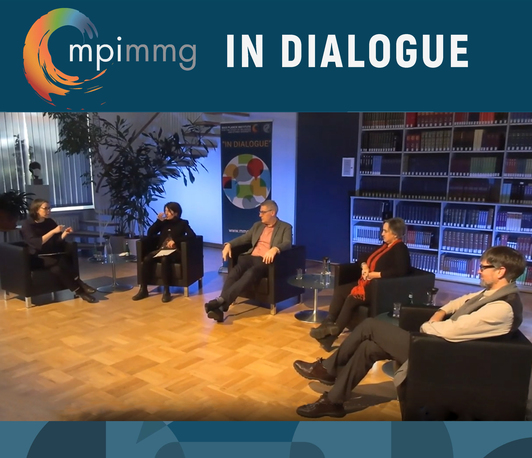MPI-MMG in Dialogue "Sanitizing Imperial Pasts"
Events 2022
- Date: Mar 10, 2022
- Time: 02:30 PM - 04:00 PM (Local Time Germany)
- Location: MPI-MMG, Goettingen
- Room: Hybrid event: Livestream/ Live, Hermann Föge Weg 11

Sanitizing the past occurs when we approach complex historical legacies from the presuppositions of present values. As the collective work of the research group has illustrated, imperial pasts are especially prone to sanitization in the current era. In this discussion, we will highlight the sanitization of Habsburg and Ottoman pasts, but our aspirations are broader. We aim to grasp the common features of sanitized imperial pasts, from the Roman and Aztec to British and Soviet. Several themes and questions will organize our conversation: What are the prominent genres and media through which imperial pasts are sanitized as collective memories? What are the political consequences of sanitizing imperial pasts? And what alternative, forms of counter-memory challenge this sanitization?
Panel participants:
- Çiçek İlengiz, “Empires of Memory,” MPI-MMG
- Matthew Rampley, Department of Art History, Masaryk University
- Wendy Shaw, Institute of Art History, Free University of Berlin
-
Jeremy F. Walton, Empires of Memory,” MPI-MMG
Moderator:
-
Jelena Radovanović, “Empires of Memory,” MPI-MMG
Matthew Rampley is extraordinary professor of art history at Masaryk University, Brno. His research focuses on the cultural politics of art and education in central Europe from the mid-nineteenth century. His books include The Museum Age in Austria-Hungary: Art and Empire in the Late Nineteenth Century (2021, co-authored with Markian Prokopovych and Nóra Veszprémi), Liberalism, Nationalism and Design Reform in the Habsburg Empire: Museums of Design, Industry and the Applied Arts (2020, co-authored with Markian Prokopovych and Nóra Veszprémi), The Seductions of Darwin: Art, Evolution, Neuroscience (2017), The Vienna School of Art History: Empire and the Politics of Scholarship 1847-1918 (2013), and The Remembrance of Things Past: On Aby M. Warburg and Walter Benjamin (2000). Among his edited volumes are Art History and Visual Studies in Europe: Transnational Discourses and National Frameworks (2012), and Heritage, Ideology and Identity in Central and Eastern Europe (2012). He leads the ERC-funded research group CRAACE—Continuity/Rupture: Art and Architecture in Central Europe 1918-1939 at Masaryk University.
Professor Wendy M. K. Shaw (Ph.D. UCLA, 1999) publishes on the impact of coloniality and Eurocentrism on art-related institutions, heritage and preservation, modern art and pre-modern discourses of perception, and religious thought under secular modernism. Her work focuses on the Ottoman Empire, modern Turkey and regions of Islamic hegemony. She is author of Possessors and Possessed: Museums, Archaeology, and the Visualization of History in the Late Ottoman Empire (University of California Press, 2003), Ottoman Painting: Reflections of Western Art from the Ottoman Empire to the Turkish Republic (IB Tauris, 2011). What is “Islamic” Art: Between Religion and Perception (Cambridge University Press, 2019, Honorable Mention for the 2020 Albert Hourani Book Award of the Middle East Studies Association and the 2021 Iran Book Award), and Loving Writing: Techniques for the University and Beyond (Routledge, 2021).
Please ⧉ click here to download the poster.
Livestream: https://www.youtube.com/watch?v=DNp6C5m1R_I
For more details please contact goldmann(at)mmg.mpg.de.